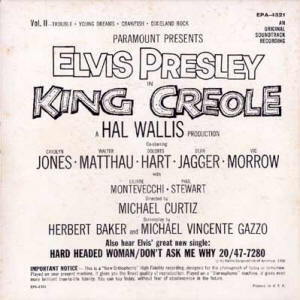Verdict
The second volume of "King Creole" was as good as the first one.
![]()
(C) RCA Victor
The ultimate site about the king of the analogue age


On July 29, 1958 RCA Victor issued the second part of the "King Creole" soundtrack. It entered the "Best Selling Pop EPs Chart" on August 25th, had a run of 22 weeks and peaked at number 2, where it stayed for 18 weeks straight. In 1992 the RIAA honored the domestic sales with a Platinum Award, worldwide RCA Victor was able to retail 1.2 million units. Today this would translate to 180 million paid streams of the complete record or 720 million paid streams of individual tracks. In other words: The second volume of "King Creole" was another major success.
The ep is not available on the streaming platforms, because all songs can be heared on the album "King Creole" (1958). In 2016 the complete Presley catalogue was restored and remastered by Vic Anesini for a boxed set of 60 compact discs called "The Album Collection". Sony Music Entertainment provides the streaming platforms with the same versions of the individual albums (in some cases with bonus tracks), albeit in 24 bit/90 khz flac. That means, if the platform of your choice supports high resolution audio, you can enjoy the tracks in the same quality Sony used to scan and master them.
Once again a promo photo for "King Creole" was used, in fact, I like the design of the second volume better than the one of the first. The backside once again advertised the single "Hard Headed Woman" / "Don't Ask Me Why".
The soundtrack was recorded on January 15th, 16th and 23rd 1958 at Radio Recorders in Hollywood/California. The sessions were produced by Walter Scharf and Phil Khagan and engineered by Thorne Nogar. The band consisted of Elvis himself (guitar) as well as Scotty Moore (guitar), Hilmer J. Timbrell (guitar), Bill Black (bass), Ray Siegel (bass and tuba), Neal Matthews (bass and guitar), D.J. Fontana (drums), Bernie Mattinson (percussion), Gordon Stoker (bongos), Hoyt Hawkins (zimbel), Dudley Brooks (piano), Mahlon Clark (clarinet), John Ed Buckner (trumpet), Justin Gordon (saxophone), Elmer Schneider (trombone) and Warren Smith (trombone). The harmony vocals were provided by The Jordanaires (Gordon Stoker, Neal Matthews, Hoyt Hawkins and Hugh Jarrett) and Kitty White (on "Crawfish"). On February 11, 1958 an additional session was held at the Paramount Soundstage in Hollywood/California. It was also produced by Walter Scharf and Phil Khagan, but engineered by Phil Wisdom. Elvis and Scotty Moore played guitar, Bill Black was on bass, D.J. Fontana on drums and Dudley Brooks on piano. Once again the harmony vocals were provided by The Jordanaires. The session had been scheduled to record "Danny" and "Steadfast, Loyal And True" as well as harmony vocals for "Lover Doll".
Trouble
Here we have another highlight. Elvis sounds angry and dangerous and delivers the best version possible of Jerry Leiber's and Mike Stoller's "Trouble". In 1968 the king opened his tv special "SINGER presents Elvis" with this song and also performed it during the "Elvis Summer Festival 1973" at the Las Vegas Hilton. But he never surpassed his original studio recording, taped on January 15, 1958 within 5 takes. "Trouble" was re-issued on the boxed set "The Other Sides - Worldwide Gold Award Hits Volume 2" (1971). The alternate version can be found on the album "Elvis" (1968).
Young DreamsThe popsong with a touch of blues was written by Martin Kalmanoff and Aaron Schroeder. The king recorded it on January 23, 1958 and selected the 8th take for release. One was in 1971 on the boxed set "The Other Sides - Worldwide Gold Award Hits Volume 2".
CrawfishElvis recorded "Crawfish" on January 15, 1958 and needed 7 takes to produce a satisfactory result. The female voice belongs to the singer Kitty White. Before its release the recording was shortened of a minute. Besides that the voice of Mrs. White was enhanced with an echo effect and put a little in the background. In the movie the female voice belongs to a lady, who promotes the crawfish she is selling with the song. Superficially the lyrics are about the catching and cooking of the animal, but of course the crawfish is a metaphor for the primary male sexual characteristic. Fred Wise and Ben Weisman wrote this (for the 50s of the previous century) bold song, which was later released on the boxed set "The Other Sides - Worldwide Gold Award Hits Volume 2" (1971).
Dixiland RockThis track was also re-released on the boxed set "The Other Sides - Worldwide Gold Award Hits Volume 2" (1971). As the title suggests, it's a rock'n'roll song with elements of dixiland music. It was supposingly written by Aaron Schroeder and Rachel Frank, but Claude DeMetrius and Fred Wise are also mentioned at times. Elvis taped "Dixiland Rock" on January 16, 1958 and needed 14 takes to do so.
The second volume of "King Creole" was as good as the first one.
![]()
(C) RCA Victor